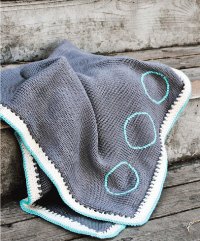The Buerk Center for Entrepreneurship awards $170,000 to eight student-led start-ups
When Katlin Jackson returned from her second trip to Haiti in January 2012, she was a woman on a mission. After spending time in a Haitian orphanage, she’d discovered that a good number of the children there weren’t orphans at all. Their parents were simply too poor to care for them. Within months, Katlin, along with UW junior Kari Davidson, cofounded Haiti Babi and entered the 2012 Business Plan Competition.
Haiti Babi now employs four Haitian mothers to knit and crochet high-quality, incredibly soft baby blankets and accessories that are sold to moms in the United States. In 12 months, Katlin and Kari have taken an idea, defined a mission (Moms helping Moms), and created a start-up company that is making real headway. They have a well-thought-out brand, fashionable products, and a detailed operations plan. Their Indiegogo campaign brought in double their fund-raising goal, pre-orders for their first blankets surpassed all expectations, and Haiti Babi has been featured in Seattle Magazine, Social Good Moms, and Disney Baby.
Much of Haiti Babi’s success can be attributed to the intelligence, drive, and dedication of its founders, but they’ve also had great help along the way. They were admitted into the Jones Milestones/Foster Accelerator in July 2012.
The JM/FA at the Foster School’s Buerk Center for Entrepreneurship is a TechStars-like program that provides a milestones-based framework, monthly coaching from Seattle entrepreneurs and investors, and connections that help student teams make the transition to start-up companies. From July 2012 to February 2013, 10 teams worked to recreate their teams, develop their technologies or get product to market, and raise early-stage funding. On February 13, eight teams were awarded between $10,000 and $25,000 for their efforts.
- PatientStream, a cloud-based electronic patient-tracking system for hospitals, licensed its technology from the University of Washington and secured a $500,000 investment from the W Fund. Ben Anderson (TMMBA 2012) is the founder, and brought in Keith Streckenbach as COO and co-founder to drive sales. Anderson quit his day job at UW Medicine/Harborview in October.
- Haiti Babi provides mothers in Haiti with employment to keep their children out of orphanages. As part of their “Moms helping Moms” mission, Haiti Babi’s mothers knit and crochet high-quality, incredibly soft baby blankets that are sold in the United States. Co-founders Katlin Jackson and Kari Davidson (BFA 2014) raised funding through an Indiegogo campaign, pre-orders for blankets surpassed all expectations, and Haiti Babi has been featured in Seattle Magazine and Disney Baby.
- LumiSands was awarded a $150,000 National Science Foundation SBIR Phase-I Grant and a $50,000 gift from the Washington Research Foundation for the development and manufacture of its silicon-based alternative to rare-earth phosphors used in LED lighting. Co-founders Ji-Hao Hoo (PhD 2013) and Chang-Ching Tu have negotiated an agreement with the University of Washington, and are still in the technology development phase.
- JoeyBra, “the first sexy and comfortable fashion bra with a pocket,” closed a successful angel investment round, produced a new, quality sports bra with a waterproof pocket in a full range of sizes, and has been featured by Forbes, MSNBC, and CNN. Mariah Gentry (BA 2013) and Kyle Bartlow (BA 2013), the co-founders, have contracted with a former Miss America as a spokesmodel and will launch their product nationwide in April 2013.
- Microryza, a KickStarter-type site for smaller science and research projects,was admitted into Y-Combinator in October and moved to the Bay Area. Cindy Wu (BS 2011) and Denny Luan (BS 2011) have raised more than $170,000 and their site has funded projects from tracking Magellanic penguins to sustaining native bees and student-designed electric racecars.
Update: March 28, 2013 – Microryza was named one of the top 5 Y-Combinator start-ups to watch by Inc. Magazine. - Strideline sold more than 60,000 pairs of their signature city skyline crew socks in 2012. Co- founders Jake Director (BA 2013) and Riley Goodman (BA 2013) have organized a national sales team, are now selling in Nordstrom and Zumiez, and were the subject of a UW TV short feature
- SuperCritical Technologies has designed and will build compact modular power plants that provide up to 5MW of clean, reliable electricity for heating and/or cooling. Chal Davidson (MBA 2012) is the CEO, with Max Effgen (MBA 2012) as a co-founder. The company raised $200,000 in angel funding to complete the conceptual design and establish supplier relationships, and is currently fundraising to build the prototype.
- UrbanHarvest is an urban farming company that grows high-value hydroponic lettuces and herbs within feet of where they’ll be consumed. The brainchild of Chris Bajuk (MBA 2011) and Chris Sheppard (MBA/JD 2012), UrbanHarvest is currently negotiating with a large SoDo corporation to build a rooftop greenhouse.
So what’s next? The work certainly doesn’t stop here. As any entrepreneur knows, it takes more than six months to grow a thriving business. And that’s what the JM/FA ultimately provides at the end: additional runway. This follow-on funding is a testament to the companies’ hard work so far, and an investment in what we know they can become.
The Jones Milestones/Foster Accelerator is funded by the Herbert B. Jones Foundation and additional private donors who, like us, believe in the ability of student entrepreneurs.

